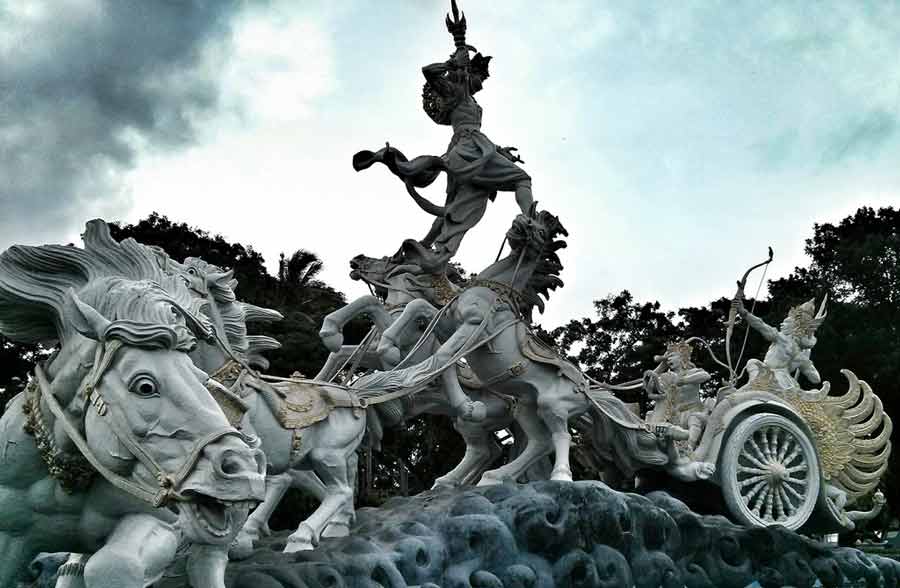
Bali chariot of Gita
In this sequel (Part II) of the paper, I wish to attempt some comparisons between Muhammad Iqbāl’s conception of the Ultimate, with reference to some
idealist notions he was introduced to, and a conception that appears in the Bhagavadgītā (Gītā).
I wish to demonstrate that in both conceptions there is a certain tension between the immutable-absolute and the dynamic-personal, and that Iqbāl and the Gītā resolve this in somewhat similar ways. Why I choose to compare Iqbāl and the Gītā is because as we encountered in Part I, Iqbāl said
he had been inspired by the Gītā.
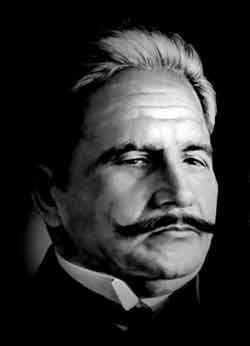
Allama Muhammad Iqbal1
As though Muhammad Iqbāl had borrowed the pan-idealist symbolism of the self (and not-self), he believed that the ultimate is best described in terms of
the ego ([khūdī] which he used interchangeably with self). The Supreme is conceived as the ultimate Ego. The term ‘ego/Ego’ is appropriate, he
believed, because it refers to a center of experience and all experience must have a center if it is to be distinguished as experience.[1] The individual ego is distinguished from ultimate Ego as the center that marks the focus of experience at
the cosmic level and is given the proper name Allāh in the Qur’ān. But 'Allāh as a distinct individual or person is conceived in terms of "pure duration"
and it is in terms of pure duration that we can conceive of "thought, life and purpose", and hence, to exist in pure duration gives us ultimate organic
unity which can be called a self.'[2]
This dense ontology needs unpacking. Let us look at it another way. Personal identity is best explained in terms of "I am". "I am" or ego as the
centralizing focus of experience that is self-referentially identifiable qua experience.[3] All self
is distinguished from not-self by virtue of this capacity for self-referentiality, but the ultimate Ego exists in pure duration with not-self in organic
unity. Iqbāl gives a phenomenological elaboration: 'To exist in pure duration is to be a self, and to be a self is to be able to say "I am". Only that
truly exists which can say "I am". It is the degree of the intuition of "I-amness" that determines the place of a thing in the scale of being.'[4] The "I-amness" of the individual marks the limits of the particular experiences.
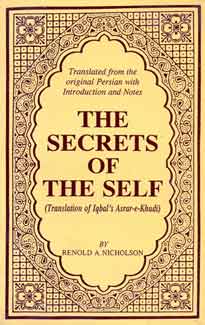
Asrar-i-Khudi
In the cosmic vastness there is the ultimate Ego or Self which is the center of all experience since it is the ground for the possibility of any
experience; this transcendental Self also expresses itself as "I am"; therein lies its personal identity. There is a fundamental distinction to be made
between our inner sense of the ego and that of God’s: 'We too say "I am". But our "I-amness" is dependent and arises out of the distinction between self
and not-self. The individual self, though possessed also of volition, is limited in its freedom and is dependent on the world, while the ultimate self, in
the words of the Qur’ān 'can afford to dispense with all the worlds.'[5] And unlike the individuated ego, the
ultimate Ego never changes into something else, and this accounts for the permanency and stability (thubūt o thubāt) of the universe. Allāh is
therefore best characterized as the cosmic personality, its source and sustainer – and this is not an anthropocentric conception either.[6]
Nor for that matter is this a pantheistic outlook, because we cannot say that there is a straightforward identification of God and the world, or that God
is the world, or alternatively that God as absolute alone is with the world merely as his mirrored illusion. Consequently, Iqbāl resolves that Allāh is the
evolving and changing nature qua God’s presence as the organic unity of the whole in pure duration, reminiscent of Rūmī’s evolutionary spiral, and
not unlike Alexander’s conception of 'Emergent Evolution'. This is essentially a finite conception of deity because durational change is admitted in the
absolute; if God is infinite, should we not look separately at the transcendent, the absolute beyond all change? To be sure, however, for Iqbāl there is no absolute that goes over the ultimate Ego: the absolute is the ultimate Ego integrated through Personality and inclusive of the universe; thus
there is no separation, of the absolute from the personal God. The ultimate is transcendence-cum-immanence in such a way that the world or rather
the creative order of nature is within God’s being. Yet it is not quite clear whether the identity of the world and God established through His presence is
one of essentiality or of substantiality. It seems he might mean both.
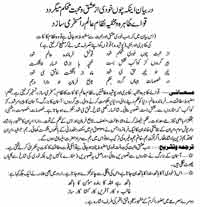
Asrar-i-Khudi Urdu
In any case, it is strictly a panentheistic view. As Vahid puts it: 'By regarding the Universe as the Ego, Iqbāl parts company with the
pantheists; and the fact that he holds the ultimate Ego to be a Personality with the attributes of creativeness, omniscience and eternity makes him a
theist. But Iqbāl’s God comprehends the whole universe and in Him alone the finite egos find their being … in short God is personalistic, theistic and
pluralistic.'[7] This is also a form of panpsychism wherein everything, from the minute atoms and
molecules to the planets and galaxies are all just the many 'ego-entities' (centrifugal essentialities) that make up the body (substantiality) of God.
There are analogues to this in the notion of the essential inseparability of paramātman and the world as Īśvara’s śarīra in the
Hindu-Vedānta philosopher Rāmānuja,[8] but more significantly in Hegel’s doctrine of the dialectical
evolution of the Spirit. One can trace a fair deal of Hegelian influence on Iqbāl, as well as the Hegelian impact on Whiteheadian 'process philosophy'[9a] which has its religious counterpart in 'process theology' (popularized in the late 20th century
by Charles Harthshorne in the West and Keiji Nishitani in the East (Japan)). Whitehead portrayed God as having a "primordial" and a "consequent" nature;
that is, He is integral to the universe and vice versa; He develops, to some extent at least, in the development of the universe. He might be said to be transcendentally immanent in it.[9]
Iqbāl claims his source to be orthodox and refers to a verse in the Qur’ān: 'And it is He Who hath ordained the night and day to succeed one another for
those who desire to think on God or desire to be thankful.'[10] From this Iqbāl argues for the notion of
ultimate reality as pure duration 'in which thought, life, and purpose interpenetrate to form an organic unity.' (Ibid) This is anything but the "unity of
Being" doctrine that the Sūfīs since Ibn-al 'Arabi had made popular. The Sūfīs considered the world of phenomena to be as waves of an ocean that emerged
from the Infinite Being only to sink back into God, thereby erasing the distinction between being and non-being, time and timelessness. Far from a pure
Oneness of Being, with its implications of illusoriness of the world in time, this unity in Iqbāl is conceived as a 'unity of a self – an all-embracing
self – the ultimate source of all individual life and thought.'[11]
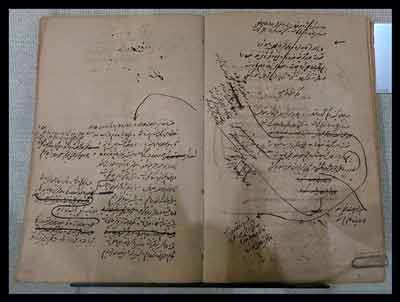
Allama-Muhammad-Iqbal manuscript
The “unity of appearance” that Sirhindī
upheld in re-interpreting al-Hallāj’s controversial and unorthodox proclamation ofana al-haqq[12] (“I am Truth/God”) is here integrated with the “unity of Being”,
(wahdat al-wujūd, al-tawhīd) to form as it were two sides of the self-same concrete reality, thereby giving ontic status to the “unity of
appearance”. Iqbāl takes over from Bergson the distinction between (finite) time and pure duration, which helps to refute the absoluteness of time and
space postulated by Ash’arī (d.953). But Iqbāl criticizes Bergson for conceiving pure duration as being prior to self, and to which self is predicated
(i.e. a priori condition for the ground of existence); Iqbāl locates the self in a pure space-time continuum but not separate from it. This may be
comparable to Spinoza’s notion of Extension as one of the two attributes of God that makes causality a real possibility (Ethica 11 passim). Unlike
Bergson, Iqbāl would argue that: 'It is the appreciative act of an enduring self only which can seize the multiplicity of duration – broken up into an
infinity of constants – and transforms it to the organic wholeness of a synthesis.'[13] Thus, unlike
McTaggart’s time, which is essentially unreal, and more like Heidegger's being-in-time, time for Iqbāl is ‘an element of the ultimate reality’
itself, and it is the a priori condition for the unity of the organic whole as it is for the unity of apperception of the ultimate Ego. Iqbāl
looks to Einstein (emerging rival of Bergson) and Haldane amongst others to evolve this view: ‘Time conceived as pure duration’ is a kind of device by
which Reality exposes [itself] as ceaseless creative activity to quantitative measurement.'[14] This
reveals, to Iqbāl, as M.S. Raschid acutely observes, the meaning of the Qur’ānic verse, 'And of Him is the change of the night and of the day.' (Qur’ān
15:161)[15] Indeed Kṛṣṇa also speaks of the ‘night and day of Brahman’ (BG V111 17-19). Raschid has
criticized Iqbāl for reading pure duration as co-extensive with self, and argues that Iqbāl is operating here with a limited and to some extent mistaken
notion of time – this is a problem indeed. But Raschid’s criticism rests basically on his observation that a.) Iqbāl has taken Bergson further than Bergson
would go, and b.) the verse that Iqbāl, invokes from the Qur’ān to support the view does not really lend itself to such a metaphysical interpretation.[16] Raschid may be right; but what to me is significant is the affinity between this view and Kṛṣṇa's
attempt to convey a sense of his ontic magnitude – to a dumb-struck warrior.
THE BHAGAVAD GĪTĀ
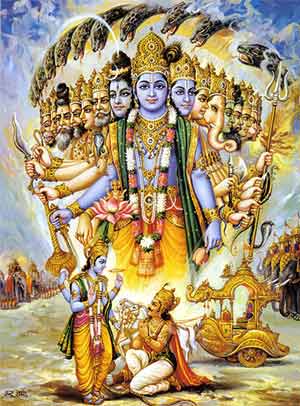
Vishvarupa
The divine Personhood in a non-absolutist sense is a notion that is also asserted in the Gītā. Arjuna suggests to Kṛṣṇa that He is the supreme
Brahman, the supreme abode, the divine and eternal Person, the primordial god, unborn and '[Y]et', observes Arjuna, 'you permeate the world by your divine
ubiquities.’[17] Thus Kṛṣṇa can say that '[A]ll the world is strung on me in the form of the Unmanifest (avyakta); all creatures exist in me, but I do not exist in them.' That is, God is immanent in nature by inclusiveness (BG XIII.27) and,
paradoxically, 'the creatures do not exist in me, while sustaining the creatures and giving them being, my self does not exist in them.' (BG 1X. 4-6). That
is, God transcends nature by exclusiveness: this imperishable is transcendent because of its beginningless and its being beyond the guṇas
(qualities) (BG XIII.31).
Iqbāl’s world of created nature, as we saw, is not so different: What we call Nature or not-self is only a fleeting moment in the life of God. His
“I-amness” is independent, elemental, absolute. It is doubtful, though, that by ‘absolute’ Iqbāl would have us understand that God is an absolute being,
impersonal and of single unity or Oneness, for, as we remarked, the duration of being allows the possibility of an organic growth of nature inseparable
from the ultimate self. 'Nature…is a structure of events, a systematic mode of behaviour, and as such organic to the ultimate Self. Nature is to the Divine
Self as character is to the human self'.[18] Or consider here Gītā’s less personalized or rather apauruṣeya metaphor: Self is the hub of the wheel of saṃsāra set in endless motion. Iqbāl ventures another oblique analogy: 'In the
picturesque phrase of the Qur'an it is the habit of Allāh.'[19] This does remind us, again, of Rāmānuja’s
suggestion of the world as though it were the organic body, the habitat, of Brahman, that Rāmānuja had read into these very verses of the Gītā.
Although, we must point out, the special ontological status that individuated self or “soul” qua jivātman is accredited with in Rāmānuja, in
respect of its identity-cum-difference relation to Īśvara, entails a much more sophisticated metaphysical doctrine of being than the "unity of
organic nature" doctrine could cope with. At least Rāmānuja is clearer in this respect in that there is for him essential identity while at the same time a
substantial differentia. What makes communion possible in Iqbāl is the fact of the ‘ego’ or personhood as the centralizing focus of experience
that both human nature and God nature share (hence echoing Spinoza's natura naturans). The human being shares equally the creative activity of
God, but beyond that she is integrally part of nature, albeit the organic unity of nature. Again, there is echoes of panpsychism here, The total oneness of
God and humankind is conceivable at an epistemological level, but not at a metaphysical level, for Iqbāl does admit appreciative intuition (of which ‘we
have a first-hand knowledge…from within’), which 'reveals life as a centralizing ego.’ This knowledge constitutes ‘a direct revelation of the ultimate
reality.'[20]
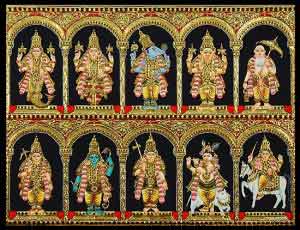
Dasavatara
Notwithstanding these ‘facts of experience’, Iqbāl is aware of the limitations of the human mind in being able to fathom the complete mystery of being, and
so ‘from the human point of view it is an interpretation which, in our present situation, we put on the creative activity of the absolute Ego.' [21] But at best it is an inference. He is almost suggesting that we end up with an anthropocentric view of
the ultimate. Or is Iqbāl alluding to what Kṛṣṇa tells Arjuna: 'The deluded disregard me in my human form, being ignorant of my higher nature as the great
Lord of the creatures… [they do not understand that] I am the eternal source of the creatures (created nature, sarvahūtānam).[22] Clearly though, the self-affirmation in respect of the “I-amness” that only an higher transcendental
being is capable of recurs several times over in Kṛṣṇa’s sermon – thus for instance, Kṛṣṇa makes it plain to Arjuna: “I am the eternal source of sacrifice,
I am the libation too... I am the fire … I am the father to this world, its mother … source, destruction and continuity, container (and) imperishable seed.
I am immortality and death … the existent and non-existent'[23] (IX. 16-19). The apparently contradictory
juxtapositioning of existence and non-existence is also not a difficulty for Iqbāl, for he finds a verse in the Qur’ān that says something like that:
'Naught is like him; yet He hears and sees.'[24]
Is this assertion of “I-amness”, however, of the same order as Iqbāl would have his ultimate Ego pronounce? I think so, if what we mean by this statement
is that the “I-amness” reflects the profoundly subtle and self-conscious but at once detached organizing principle in synthetic unity with the created or
self-emanated collective, i.e. Nature, intending it towards a purposive or teleological goal. That God has a purpose for his creation is beyond a shred of
doubt in the Qur’ān: “God is equal to his purpose, but most men know it not” (12:21).
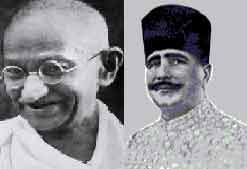
Mohandas Karamchand Gandhi and
Allamah Muhammad Iqbal
Kṛṣṇa expands further on his identification with organic unity of the world by elaborating on the divine ubiquities by which he is permeated in the world,
i.e. the extent of his spirit-immanence in the world of matter: 'I am the self that dwells in all beings, I am the beginning, the middle, and the end of
beings. Of the Vedas I am the Sāmaveda, of the Gods I am Vāsava (Indra), of the senses the mind, of the creatures the consciousness … I am the wisdom of
self among all wisdom, I am ‘A’ among syllables, I am everlasting Time, the Placer who looks everywhere, and the how of things to be. I am victory, the
resolution (will), the courage of courages … not a being standing or moving can exist without me. There is no limit to my divine ubiquities …' (BG X.
20-42). Kṛṣṇa speaks as though there were infinite time, and the spirit stretched out, as it were, throughout its boundless limits, in which his Will and
Thought played sport, and when he gets tired then: 'I am Time, grown old [resolved to] destroy the world' (BG XI.32).
In the thirteenth chapter Kṛṣṇa explains that this body is called the field and the one who knows calls this ‘field’ the ‘guide’ to this field. (‘I am the kṣetrajnā in the kṣetra’). This is buddhi in its mahat form in its role of directing ‘field’ in reflective synthesis.
To Iqbāl, thought qua intuition has the function of moving into the infinitude of knowledge or organic unity.
Now I am not suggesting that what Iqbāl says on nature and the relation of nature to divinity is exactly what the Gītā postulates. One can’t,
though, but be impressed at the distinctive resemblance in the two characterizations. Iqbāl’s idea that 'nature is not a pure mass of materiality occupying
a void, but is a structure of events and a systematic mode of behaviour', albeit determined from within the absolute ego, is, as we saw, not alien to the Gītā’s view. Further, the unity of thought and will, intelligence and vitality, and the boundlessness of the creative extension of the ultimate
Ego in which nothing limits its finality, may be stretched into Kṛṣṇa’s assertion that 'Resting on my own nature I create, again and again, this entire
aggregate of creatures involuntarily by the force of my own nature' (BG IX.9). Elsewhere Kṛṣṇa attributes immeasurability, infinitude and monopoly to this
power. (XI.25; X.39-42) Nature, then, must be understood as a living, evergrowing organism whose growth has no final external limits. Its only limit is
internal, i.e. the immanent Self which animates and sustains the whole.[25] Or, as Iqbāl would put it, “The
Ultimate Ego that makes the emergent emerge is immanent in nature, and is described by the Qur’ān as the First and Last, the visible and the invisible.'[26] Indeed, how much this sounds like the tropes of the ‘manifest’ and the ‘unmanifest’ of the Gītā
! But what are the limitations of the immanent and what causes them? Iqbāl is not so clear here, though he agrees that 'all activity is a limitation
without which it is impossible to conceive God as a concrete operative Ego.'[27] The Gītā is more
specific about the internal constraints, which have largely to do with the wheel of karma, set rather early in motion, a bit like the divine
clockwork of Spinoza’s God. There is further constraint as a result of people not adhering to dharma and therefore bringing about disequilibrium
in the universal retributive system. To Iqbāl, ‘the twin fact of moral and physical evil stand out prominent in the life of Nature’.[28] The increase in adharma, according to the Gītā, it seems, upsets the efficiency of
the ultimate Ego and impels it as it were to gather its expansive unmanifest force, like the tentacles of an octopus, into its center only to burst upon
nature in some manifest form: this is the avatāra-thesis of the Gītā. (BG IV.4-8) Indeed, this is not unlike Iqbāl's near admission to
the plausibility of the buruz of Muhammad (suggested by the Qādīyanias), - or lāhūt-nasūt of Hallāj – as though he were a re-incarnation
in the Āryan sense, for the purposes of bringing prophethood to its finality. But Iqbāl rejected this claim on some other grounds.[29]
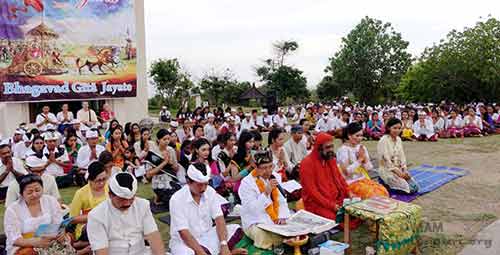
Bhagavadgita festival in Bali
Was Kṛṣṇa a prophet? Sirhindī did not deny that India had been sent prophets, but lamented that the message of the prophets were either rejected at immense
cost to the land, or they were misused by Brahmins in their selfish claim that the divine dwelled within them as a means to attracting favors and worship
from the people.[30] Iqbāl might have been happier to settle for Kṛṣṇa as a pre-Qur'anic prophet than as an avatāra, whatever that might mean in this context.
The picture that emerges, in Iqbāl at least, has the absolute Ego as the whole of reality. But the imperishable, unchanging, and permanent reality also has
another side to it, alyhough not apart from it, which is dynamic, changing, located in space and time in a non-finite continuum. But change is not
interpreted as a perishable series of appearances: the ultimate Ego exists in pure duration wherein change ceases to be a succession of varying attitudes,
and reveals the true character as continuous creations; untouched by weariness; not 'unseizeable' by slumber or sleep.[31] Indeed, Kṛṣṇa describes himself as though he were the first unmoved mover, ceaselessly engaged in
action that, however, does not bind him since he remains disinterested in their fruits (IX. ibid). Like Gītā, Iqbāl could not conceive
the ultimate Ego as changeless, for this would be 'to conceive Him as utter inaction, amotiveless, stagnant neutrality, an absolute nothingness'. To us
change might imply imperfection – as it certainly did also to Plato – but to the 'Creative Self change cannot mean imperfection; he remains untouched by it
as the calm in the centre of a whirlpool.' God's life is one of continuous self-manifestation. And when Kṛṣṇa utters that "I am the source of that which is
not yet", Iqbāl would say in the same vein that the "not yet" of God means unfailing realization of the infinite creative possibilities of his being, which
retains its wholeness throughout the entire process.[32]
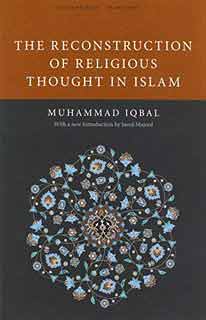
"The Reconstruction of Religious
Thought in Islam" by Iqbal
Iqbāl concludes that 'Ultimate Reality is a rationally directed life. To interpret life as ego is not to fashion God after the image of man. It is only to
accept the simple fact of experience that life is not a formless fluid, but an organising principle of unity, a synthetic activity which holds together and
focalises the dispersing disposition of the living organism for a constructive purpose.'[33] This sort of
teleological basis for the existence of nature is something Kṛṣṇa tries hard to convey to Arjuna with all the optimism of an Iqbāl drunk not on an
intellectual view of life – which he says is not necessarily pantheistic – but on an intuitive-pragmatist vision. Though in points of analysis, I find it
difficult sometimes to distinguish Iqbāl's ontology from a pantheistic one; perhaps, as we suggested earlier, "panpsychic panentheism" is a better
designation for his view. The symbolism that comes to mind here is that of the upside down aśvatthah tree with its roots above and fruits below
(BG XV.1). But Iqbāl would have the roots descend and entwine more and more into the world of the fruits; and yet God might be a mystery far beyond human
comprehension. But it is the link between God's personality and our own personality that makes the bridge less formidable, and thus in the "I-thou"
relation there is a distinct possibility of union between the human and divine. On this point at least, Iqbāl and the Gītā converge.
The two serialized articles in Sutra Journal are a revised issue of the author's contributions in the field that appeared as `Muhammad Iqbāl and the Bhagavadgītā' (two parts), in The Journal of Religious Studies (Patiala). XVII no 2 Spring 1989, pp. 77‑93; and no 3 Autumn 1989,
pp. 70-81. Long since unavailable to the scholarly community I decided to make these articles available online; and long since moved away from a
preoccupation with the hermeneutics of theism as evidenced in these articles with a certain Mīmāṃsic distance.